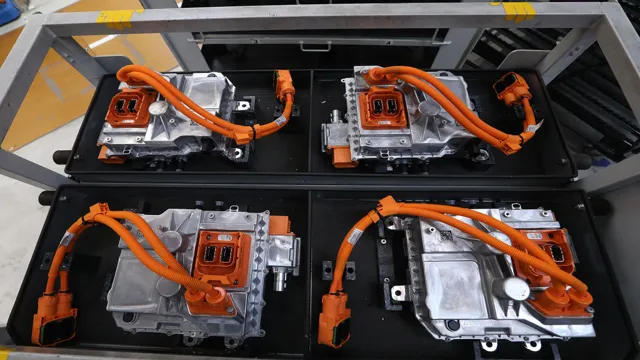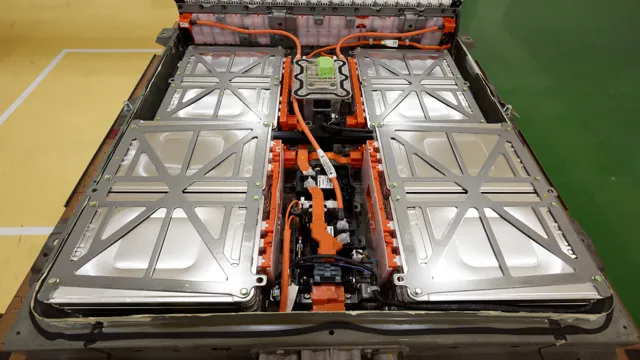Shocking Truth About Electric Car Battery Dangers You Don’t Want to Miss
Electric car batteries are an exciting new innovation that has captured the imagination of drivers everywhere. They’re clean, efficient, and emit no harmful emissions! But there’s a dark side to this metal marvel that is often overlooked: the inherent danger of electric car batteries. It’s no surprise that people are concerned about their safety – after all, we’ve all heard stories about lithium-ion batteries catching fire.
So what’s the deal with these batteries, and just how dangerous are they? Well, the truth is, there’s still a lot that we don’t know. But one thing is for certain – there are some real risks associated with lithium-ion batteries. Some estimates suggest that there are nearly 10,000 electric car fires every year, and many of these are due to battery issues.
These batteries can suffer from thermal runaway, a phenomenon where the temperature of the battery increases rapidly and uncontrollably, leading to overheating and even combustion. But it’s not just fires that are a concern. Electric car batteries are also incredibly heavy and contain a lot of energy, which makes them potentially hazardous in a crash.
If the battery is damaged in an accident, it could release this energy in a sudden and explosive manner, causing serious harm to anyone nearby. There have been some cases of electric car accidents where the battery has caught fire and caused severe burns or even fatalities. So does this mean that electric cars are simply too dangerous to be on the road? Not necessarily.
There are plenty of safety measures in place to minimize the risks associated with these batteries, and manufacturers are constantly working to improve their designs. But it’s important for drivers to be aware of the potential hazards and take steps to mitigate these risks – things like regular maintenance, careful driving, and proper storage can all help to reduce the likelihood of battery-related accidents. In the end, electric car batteries are a trade-off.
They provide numerous benefits, but they also come with some real risks. As with any technology, it’s up to us to use them responsibly and make sure that we’re doing everything we can to stay safe.
Risk of Fire and Explosion
Electric car battery dangers have been a topic of concern for many. One of the main risks associated with electric car batteries is the risk of fire and explosion. This is because these batteries are made up of flammable electrolytes, which can catch fire and cause explosions if they are not handled properly.
In addition, electric car batteries are usually made up of multiple cells, which means that if one of these cells overheats or becomes damaged, it can quickly spread to the other cells and cause the battery to ignite. However, car manufacturers have taken steps to mitigate this risk by putting safety measures in place, such as installing thermal management systems and sensors that detect overheating and shut down the battery. It is important for owners of electric cars to be aware of these risks and to take proper precautions, such as avoiding overcharging the battery or using a damaged charging cable.
Overall, while there are risks associated with electric car batteries, with proper measures in place, the risk of fire and explosion can be greatly reduced.
Lithium-Ion Batteries
Lithium-ion batteries have become a ubiquitous part of our lives, powering everything from our smartphones to electric vehicles. However, as convenient as they are, they also come with a significant risk of fire and explosion. This is because lithium-ion batteries contain highly reactive materials that, if handled improperly, can cause them to short-circuit or overheat.
In fact, the risk of fire and explosion increases significantly if the battery is damaged or exposed to high temperatures. It is important to note that not all lithium-ion batteries are created equal, and some are more prone to these issues than others. As such, it is essential to handle and store these batteries carefully and only use them with devices that are designed to accommodate them.
Remember, while lithium-ion batteries offer a lot of benefits, they can also be dangerous if not treated with respect.

Overheating
Overheating electronics can be a major cause of concern, especially when it comes to the risk of fire and explosion. We’ve all heard stories about devices that have spontaneously combusted due to overheating. This is because when electronic devices become too hot, they can suffer from thermal stress, causing components to degrade or malfunction.
In some cases, this can lead to sparks or flames, which can quickly ignite nearby materials. In more severe cases, it can even result in an explosion. That’s why it’s important to ensure that your electronic devices are kept cool and well-ventilated, either by using cooling pads or by regularly cleaning out any dust or debris that may be clogging up the internal components.
By taking these simple precautions, you can minimize the risk of your devices overloading and potentially causing a fire or explosion.
Collision Damage
Collision damage is a common occurrence that many drivers experience at some point in their lives. However, what many people don’t realize is that collision damage can also lead to a risk of fire and explosion. When a vehicle collides with another object, it can cause significant damage to the fuel and electrical systems in the car.
This damage can then lead to leaks or short circuits, which can, in turn, spark a fire or an explosion. Such accidents can happen even after a minor collision, so it’s essential to take any collision damage seriously. You should have your vehicle inspected by a professional mechanic to ensure that there is no damage to the fuel and electrical systems.
It’s also crucial to keep an eye out for any unusual smells, such as fuel or burning odors, which could be an indication of a possible fire or explosion. In short, collision damage can be more dangerous than it appears at first glance, and it’s essential to be cautious and take necessary precautions to prevent any accidents from happening in the first place.
Health Risks
While electric cars are becoming increasingly popular due to their environmental friendliness, there are concerns about the potential risks associated with their batteries. One of the most significant dangers of electric car batteries is the possibility of thermal runaway, which occurs when the battery becomes overheated and can lead to a fire or even an explosion. However, it’s crucial to note that the likelihood of such an event is quite low, and safety features are built into electric cars to minimize these risks.
Additionally, the materials used in electric car batteries are typically non-toxic and less harmful to the environment compared to traditional gasoline-powered cars. Overall, while it’s important to understand the potential risks associated with any vehicle, including electric cars, the benefits to the environment and reducing our dependence on fossil fuels make them a promising alternative for the future.
Chemical Exposures
Chemical exposures can pose serious health risks to individuals in various situations. For instance, workers in factories may be exposed to hazardous chemicals in the workplace, while individuals may encounter toxic substances in their daily lives, such as contaminated water or polluted air. Exposure to such chemicals can lead to various health problems, including respiratory issues, skin irritation, and even cancer.
It is vital to understand the potential hazards of chemical exposure and take all necessary precautions to minimize the risks. This can include wearing protective gear while working with hazardous chemicals, properly storing and disposing of toxic materials, and reducing exposure in everyday life. By being aware of the potential health risks associated with chemical exposures and taking steps to protect ourselves, we can help ensure a healthier and safer future.
Electromagnetic Fields
Electromagnetic fields (EMFs) are produced by many of the electronic devices we use on a daily basis, such as cell phones, computers, and even household appliances. While there is still debate about the potential health risks of EMFs, some studies suggest that long-term exposure could lead to a range of health problems, including cancer, neurological disorders, and reproductive issues. It’s important to understand that the amount of exposure we receive from these sources is relatively low, and experts agree that the risk of harm is small.
However, it’s still a good idea to take steps to reduce your exposure whenever possible. For example, you can use hands-free devices to keep your cell phone away from your head, and avoid holding your laptop on your lap for extended periods of time. Ultimately, the best way to protect yourself from potential risks related to EMFs is to stay informed and make informed choices about how you use technology in your everyday life.
Safe Handling and Maintenance
Electric cars are quickly becoming the norm on our roads, but it is important to note that they are powered by powerful batteries that come with their own risks and dangers. Safe handling and maintenance of electric car batteries are crucial to prevent potential hazards. One of the most significant dangers comes from electrocution or electrical shock.
It’s essential to understand that even a small electric current can be lethal, and handling electric car batteries with care and caution is crucial to prevent any accidents. Battery breakage and chemical leakage are other potential hazards of electric car batteries, and they can release toxic gases and chemicals that pose severe health risks. Therefore, it’s crucial to get proper training in handling and maintaining electric car batteries safely and follow proper procedures at all times.
Regular check-ups and maintenance routines should be part of your battery handling and maintenance plan to detect any damages or leaks early enough before they escalate into severe hazards. Overall, proactive maintenance and care are crucial to mitigating any potential dangers associated with electric car batteries.
Proper Storage and Charging
Proper storage and charging of your electronics will extend their lifespan and help you avoid potential safety hazards. When it comes to storing your devices, keep them in a clean, dry area and avoid exposing them to extreme temperatures or humidity. It’s also important to keep them away from direct sunlight and magnets, which can cause damage to the circuitry.
If you’re not using your electronics for an extended period, such as going on vacation, it’s best to remove their batteries entirely. When it comes to charging, always use the manufacturer’s supplied charger or an equivalent that is compatible with your device. Avoid using cheap chargers that don’t meet safety standards, as they can overheat and cause fires.
It’s also important to charge your devices on a flat, stable surface and avoid charging them on flammable surfaces like bedding or carpet. Another important aspect of safe handling is to inspect your electronics regularly for any signs of damage to cords, plugs, or batteries. If you notice any frayed wires or loose connections, stop using the device immediately and have it repaired or replaced.
By following these tips, you can ensure that your electronics remain in good condition and avoid potential hazards such as electrocution, fires, or explosions. Remember, proper storage and charging is crucial for the safety and longevity of your electronics.
Maintenance and Inspection
When it comes to safe handling and maintenance of equipment, it’s crucial to follow manufacturer guidelines. Scheduled maintenance and inspections can prevent equipment failure and potentially dangerous situations. It’s essential to check equipment regularly, including inspecting for any wear and tear, loose parts, or faulty wiring.
Similarly, proper handling of equipment can prevent accidents and injuries, such as using personal protective equipment. Remembering to turn off equipment and disconnecting it from the power source when not in use can save lives. Ultimately, safety should always be a priority when handling and maintaining equipment.
By prioritizing maintenance and inspections, you can ensure your equipment’s longevity and minimize the risk of accidents.
Future Developments
Electric car battery dangers are a topic of concern for many people, especially as more and more electric vehicles hit the roads. While electric cars are generally considered safer than traditional gasoline-powered vehicles, they do come with their own set of risks. One of the biggest dangers associated with electric car batteries is the potential for thermal runaway.
This is when the battery overheats and begins to release energy in an uncontrolled manner, potentially leading to a fire or explosion. Battery manufacturers are continually working to develop new safety features to prevent thermal runaway, such as better cooling systems and improved battery management software. In the future, we can expect even more advanced safety features to be incorporated into electric vehicles to address any potential safety concerns.
Conclusion
In conclusion, while it is true that electric car batteries pose potential dangers, it’s important to remember that every technological advancement comes with some level of risk. However, with proper safety regulations and continued advancements in battery technology, we can limit these dangers and ultimately pave the way towards a greener, more sustainable future on the road.”
FAQs
What are the potential dangers of an electric car battery?
Some potential dangers of an electric car battery include the risk of fire or explosion from a battery malfunction, as well as exposure to toxic chemicals in the battery if it is damaged.
Can electric car batteries cause health problems?
In general, electric car batteries are safe. However, if the battery is damaged or improperly disposed of, there is a risk of exposure to toxic chemicals that can lead to health problems.
How often should electric car batteries be replaced?
Electric car batteries typically last for several years, but the exact lifespan can vary depending on factors like usage patterns and environmental conditions. Most manufacturers recommend replacing the battery after around 8 to 10 years.
What steps can be taken to minimize the risk of electric car battery dangers?
To minimize the risk of electric car battery dangers, it is important to follow all manufacturer guidelines for charging and storing the battery, as well as avoiding damage and ensuring proper disposal at the end of its lifespan. Regular maintenance and inspections can also help detect any potential issues early on.





